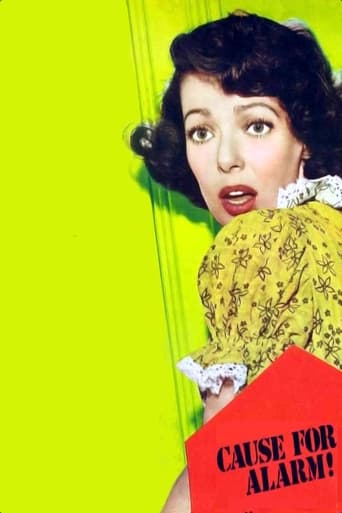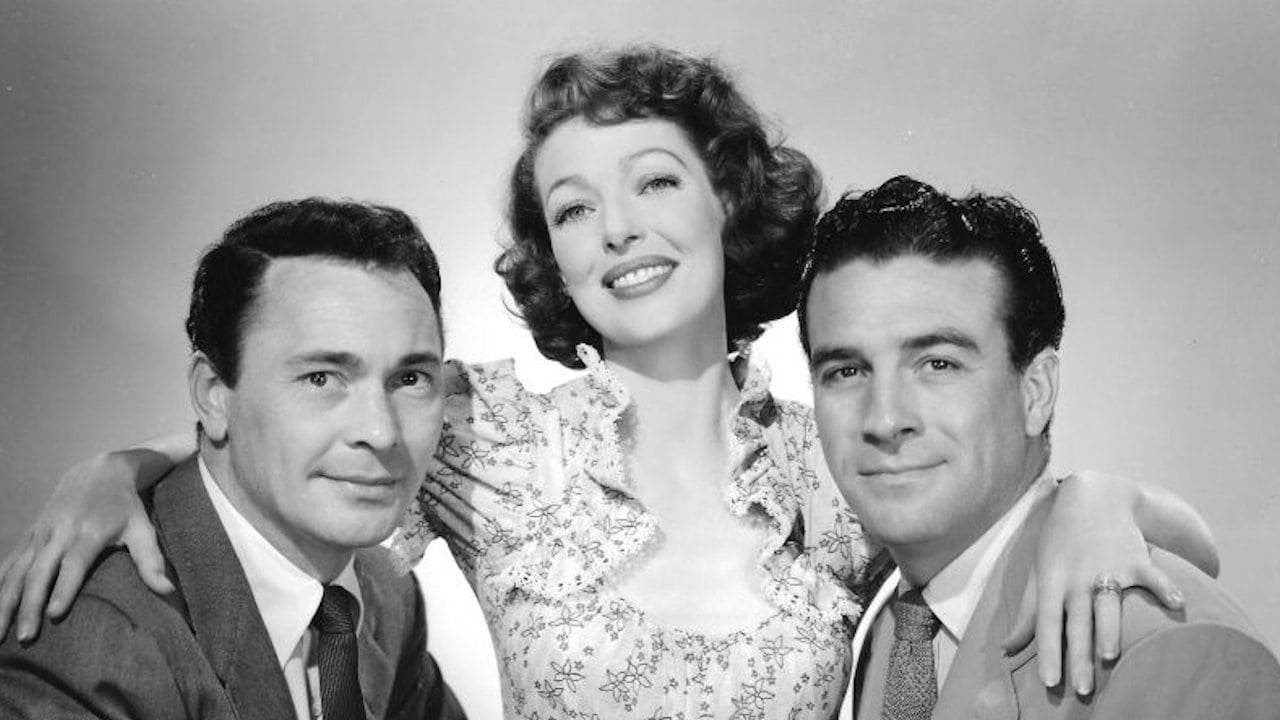arfdawg-1
Invalid George Jones is both physically and mentally ill. He mistakenly believes his wife Ellen and his doctor are having an affair and also planning to kill him. He writes a letter to his lawyer detailing their alleged murder plot. After he has Ellen give the letter to their postman, he reveals its contents to her and then threatens her with a gun. The excitement proves to much and George suffers a fatal collapse. Now Ellen must find a way to retrieve the incriminating letter. Lana Turner is sort of miscast in this film and the entire movie is directed like a TV film.One BIG problem I had watching it is that the transfer print, although crisp was wobbly.It's likely the negative was warped and it didn't make a good print.
LeonLouisRicci
As the 1950's started to Unfold many Folks, who could Afford it, moved to the Suburbs and caught in the Tailwind was Film-Noir. For Better or Worse, mostly Worse, it became the Death Noll of the Genre, or at least a Transformation, or to be more Cynical, a Devolution. This Reminds of an Alfred Hitchcock Hour Episode. MGM, by this Time, had Relegated its B-Unit to these types of "Noirs" that RKO and WB were Proudly Producing for Years as MGM Snubbed the Trend as Beneath Them.But here it is, a Vehicle for the Fading Beauty and Star Power of the Screen Queen Loretta Young. It is a Little Film in all Respects. Shot on the Cheap in a Couple of Weeks it manages to Create a Pretty Good Suspenser. Miss Young Looks Ridiculous pushing a Vacuum Cleaner but Quickly Collapses and gets Sucked Under from the Stress of an Invalid Husband Slowly Losing His Mind. She Completely Loses it and comes Unglued, Panics, and with Great Anxiety tries Unsuccessfully to Retrieve an Incriminating Letter. It all Ends with a Twist Worthy of Hitchcock Hour, Twilight Zone, Thriller, and E.C. Comics that became so Popular.Just Wondering, since this was a Movie and TV was an Emerging Competition, was it Intentional to have a "Little Toy TV" as a Symbol for a Little Novelty Unworthy of Cinema? It's so Tiny and Insignificant. Ironically this Film was Exactly the Type of Production that Television would Adapt and Prophet on Forever.
robert-temple-1
This is a nail-biter! Loretta Young is so good in the lead role of an ordinary housewife faced with her life being destroyed, that she evokes the utmost sympathy for her peril. It may be her finest performance on screen. She starts out as a smiling, contented suburban wife who is looking after her husband who is upstairs in bed with a heart condition. The film throughout uses an interior monologue technique for her. And this is where Loretta Young especially excels, for she has perfectly timed her changes of expression to coincide with the passages of narration, and shows more changes of thought and emotion on her face than most actors or actresses could do in such circumstances. Without her ability to make this convincing and moving, the film would have been a miserable failure. The film was thus a risky venture, but it worked beautifully, and the result was the most desperate tension imaginable. The film was directed by Tay Garnett, who is perhaps best known for directing John Garfield and Lana Turner in the noir classic THE POSTMAN ALWAYS RINGS TWICE (1946). After the mid-fifties, Garnett turned to directing for television, including several of the Loretta Young Show episodes. Young's problem in this film evolves dramatically in front of our eyes. Her loving husband, played by Barry Sullivan, has developed a serious mental illness coincidentally with his physical illness. He has developed paranoid fantasies about her carrying on with another man who is a friend of theirs and also their doctor (played by Bruce Cowling). But this has evolved into a potentially violent psychotic state. Until the very last moment, she is blissfully ignorant of his mental condition, which is so far beyond her comprehension. At first she manages to brush aside her husband's accusations of an affair, telling herself he is just under a lot of stress because of his illness. But then he informs her that he has written a long letter to the Los Angeles District Attorney saying that she and the doctor, 'her lover', were conspiring to kill him. Young has innocently posted this fat letter that very day, thinking it was insurance papers of some kind. But when her husband pulls a gun on her and, having locked the door so that she cannot escape from the bedroom, she finally realizes that he really intends to kill her. He struggles to rise from the bed in order to shoot her dead, but before he can pull the trigger, he collapses and dies of a heart attack. She is seized with shock and fear and tries to pull the pistol from his hand, but sets it off and fires a shot into the floor, which is heard outside, but only by a cute little boy on his tricycle playing at being the film cowboy hero Hopalong Cassidy. There are amusing scenes in the film between Young and 'Hoppy', as she calls him (the first credited screen performance, aged 9, by Brad Morrow, credited here as Bradley Mora, his real name). Fortunately the woman next door, who is such an inquisitive neighbour watching all the comings and goings, did not hear the gunshot. Then Young panics and realizes that she and the doctor will be blamed for her husband's death because he claimed they were over-dosing him on his heart medication and plotting to kill him, and they had over-ordered some, as some had been spilled. So she rushes out in a dead sweat to try to persuade the postman to return the letter to her. But he says it is against regulations, although she can go and see the superintendent at the post office if she can get there by 2:30, and he can return the letter to her. Meanwhile, the husband is lying dead at home. Young goes to see the superintendent but he says he can only return the letter if her husband signs a letter requesting it, seeing as he is confined to bed. This poses something of a problem, considering that the husband is not alive anymore, but she cannot tell him that and becomes more and more desperate. She pleads and then demands, and is dismissed by him after he loses his patience entirely. Her dilemma has been made far worse by her husband's aunt coming round and wanting to go upstairs and see him, and a number of other visitors appearing or interfering and delaying her. Young becomes more and more dishevelled and pouring with sweat, running along the streets in the intense summer heat like someone running for her life, which she is. Before our eyes, she turns from a quiet, demure housewife into a desperate, pleading, bullying, insistent vixen fighting for her life. The transformation is so convincing that Young carries us along with her as she disintegrates in front of our eyes and loses all self control. Her outbursts are tempered with interior monologue rebukes to herself telling herself that she must be calm, must be calm. It is all extremely harrowing. The ending is most extraordinary, a touch of genius, but I cannot reveal it. You need strong nerves to watch this desperate tale.
Neil Doyle
CAUSE FOR ALARM comes across as a TV programmer type of film that has all the earmarks of something made for television in the '50s--despite the fact that it was a theatrical release. Everything about it looks artificial, including the pristine neighborhood. You expect Ozzie and Harriet to appear any moment.The drama itself is well played by LORETTA YOUNG and her paranoid hubby, BARRY SULLIVAN, who concocts a way to get her accused of killing him with the help of her doctor friend, of whom he is jealous. After his accidental death, every step Young takes is only going to make her look more guilty. Silliest of all is her scene with a by-the-book postman who won't return the letter to her after she chases him across town to catch up with him. The postman is played in his usual goofy manner by IRVING BACON.But to give credit where it's due, Loretta handles the panicky situation with a convincing lack of poise while making all the missteps that almost land her in serious trouble with the law. The contrived ending gives the story a nice twist.No more than a B-film, it owes a great deal to Young for making the impossible situations seem reasonable enough.


 AD
AD



